Beeck Family.
The family of August and Christiana Beeck left the German/Polish town of Posan, in 1847 to accompany their Lutheran [2] pastor and his whole congregation to move to South Australia to escape religious persecution. The Prussian Government of the day had introduced compulsory allegiance to the State Church. The faithful Lutheran congregation believed in freedom of worship and to follow this ideal, they fled their country of birth on the “Gellert” for a new beginning in the young colony of Australia.
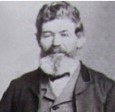
They settled in South Australia around Lobethal with their family of five boys, having brought two of them out on the ship “The Gellert”. After marrying Maria Hermine Borman, August and Christiana’s son, Emil Robert Beeck tried different types of employment, from working in the lime works as a young man, to farming the land. He moved often and some of his growing family of twelve took up farming in the district.
Following drought and economic hardship, a number of farmers came across to Western Australia to see if the land was any more reliable for farming. They travelled up into the Great Southern area and found the town of Katanning with its own flour mill. The land appeared to be fertile so Emil sent back to South Australia for his family to sell up their farms and move west.
In February 1892 Emil’s wife Hermine and eleven of their twelve children and their families sailed into the port of Albany on the ‘South Australian.’ A special train was needed to bring all the family, their belongings, food, machinery and livestock to settle in the Katanning district.
The original farm was known as “Capemont“, from which the family spread, most members taking up land in the immediate district. “Summerfield“, “Orange Grove“, “Garden Valley“, and “Raspberry Hill” were some or the other original farms to be established in the area. The family have spread throughout the district; some are still farming, while others have spread throughout the land and around the world. Since settling in Katanning three amazing family reunions have been held. The first in 1952; the second in 1992 and the most recent in 2012.
The Beeck family was one of the pioneering families in the district and played an important part in the development of Katanning and surrounding areas including community and civic activities. ‘They loved God, their family and the land’
.
EMIL ROBERT BENJAMIN BEECK 1871-1942
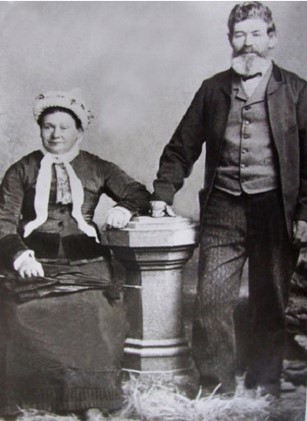
Maria Hermine (nee Borman) and Robert Emil Beeck
Emil Robert Benjamin Beeck was born on October 12 1871, in Monarto, South Australia, to Emile Robert Beeck and Maria Hermine Beeck (born Borman). Emil had nine siblings: Gustav Adolph Beeck, Anna Christianna Prosser (born Beeck), Emma Lydia Beeck, Henry Otto Beeck, Hermine Sophie Pym (born Beeck), John Albert Beeck, Maria Otilia Webse (born Beeck), Paul August Beeck and Fredrich Wilhelm Beeck.
Emil married Caroline Sarah Annie Beeck (born Laidlaw) on April 23 1896, at age 24 in Katanning, Western Australia. The couple had five children: Eric Harold Beeck, Christina May Archer (born Beeck), Florence Annie Beeck, Stanley Theodore Beeck and Violet Maude Beeck.
Emil passed away on November 15, 1942, at age 71 in Bayswater, Western Australia and was buried in Karrakatta Cemetery, Perth.
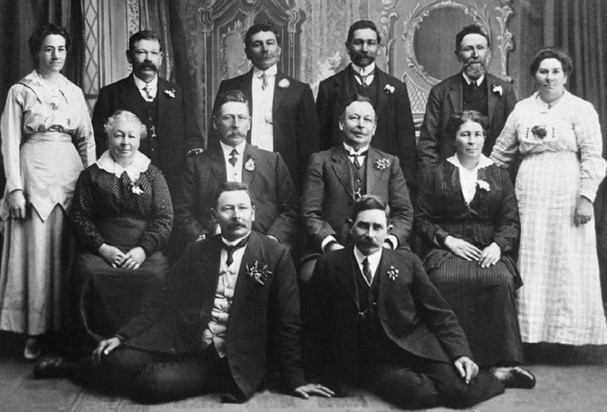
Back: Emma, Paul, Moritz, Emil Junior, Carl (Charlie), and Anna Centre: Otilie (Tillie), Frederick (Bill), Gustav (Gus), and Sophie Front: Johannis (John), and Heinrich (Henry)
.
Death of E. R. Beeck.
A KATANNING PATRIARCH.
Great Southern Herald
24 January 1914 – P2 & 3
At four o’clock on Thursday morning there passed away peacefully a Katanning patriarch in the person of Emil Robert Beeck, leaving a widow and twelve grown up sons and daughters, and a strong force of grandchildren.
Mr Beeck was born in Posan, Germany, in 1832, and was in his 82nd year. He came with his parents to South Australia in his 14th year, and was soon at work at the North Adelaide lime works. His next venture was a hotel at Lobethal where he married a compatriot, Miss Hermina Borman.
From there he moved to Monarto on the road to Melbourne, where he essayed the precarious work of farming and met with reverses. Going a little further on the same road he went farming at Mobilong where the conditions were much more promising, and he might have made a success had not his son William gone to Western Australia, and sent good reports of the new country.
Mr. Beeck came over 22 years ago and made a start at Capemont, the present residence of Mr. H. O. Beeck, but not being content with the slow processes of rural industry, Mr. Beeck opened a butchering business in Albion Street, Katanning, and later on built a store in Carew street, opposite the recreation ground. Finding business was too heavy for him he returned to Capemont for a time, and later on he sold out that property to his sons H. O. and J. A. Beeck, and retired to his cottage residence in Katanning where he spent the remainder of his days.
But this bare outline conveys but a meagre idea of the energy and enterprise of Mr. Beeck. At an early stage of his West Australian career he sent back to Monarto, the scene of his hardest struggles, the money necessary to make good the deficiency incurred there. Then he turned his attention to public spirited efforts for the encouragement of high-class farming in this district.
Before the time had arrived, in the opinion of his fellow agriculturalists, he urged the establishment of an agricultural society, and as he could not enlist sufficient support he decided to show the way by carrying out an exhibition all on his own. He engaged the Agricultural Hall and filled it with a really excellent collection of exhibits representative of farming and domestic industries, and thus prepared the way for the society that was soon afterwards formed and has had such enormous influence for good on the industries of the district.
In this and many other ways Mr. Beeck showed himself a man of strong convictions, and some times his unwillingness to take what seemed an easier course caused him to fall back on his own resources and his own companionship. But he won and held the confidence and esteem of all who came in contact with him as a man of simple life and business honour.
Although his health had been failing for some time he was briskly moving about a very short time before his death. Complications of asthma and bronchitis were the immediate causes of death. He had, however, the consolation of having a number of his daughters and sons around him, and in knowing that they were all following his example of industry thrift and integrity.
The funeral took place in the Katanning cemetery yesterday afternoon. Rev. W. Gilmour read the solemn service, and the funeral arrangements were conducted by Mr. J. Squiers. The pall-bearers were: Messrs. A. E. Piesse, M.L..A., R. L. Richardson, C. F. Wanke, W. J. Rogers, F. M. Gare, J’s. P., and W. L. Rhodes.
Mr. Beeck’s widow is 74 years of age and in somewhat delicate health, and the family consists of Mrs. J. H. Webse Mrs. Pym, Mrs. A. Prosser, and Mrs. Truslove, Messrs. G. A. Beeck, F. W. Beeck, C. F. Beeck, M. E. Beeck, P. A. Beeck, E. R. B. Beeck, H. O. Beeck, and J. A. Beeck.
.
HEINRICH OTTO BEECK
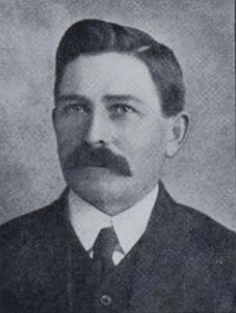
Henry Otto Beeck, 1875–1941
Heinrich Beeck is a son of Mr. Emil Robert Beeck, and was born in Monarto, South Australia on June 23, 1875, where he also completed his education. Leaving school at an early age, he made himself of considerable use on his father’s farm, paying special attention to the sheep-raising industry, and gaining experience which proved of great value to him in his subsequent career.
In February 1892 he sailed into the port of Albany on the ‘South Australian’ with his mother, Hermine and the rest of his family. A special train was needed to bring all the family, their belongings, food, machinery and livestock to settle in the Katanning district.
Upon arrival, he accompanied his father to the Katanning district, where the original holding of “Capemont” was selected as suitable for mixed farming operations. Upon the retirement of Mr. Beeck, senior in 1903, the estate was divided among the brothers, nearly 1,500 acres falling to the share of Heinrich. More
.
MR. GUSTAV A. BEECK. J.P.
Gustav Adolf Beeck was born on 2 October, 1859, in Lobethal, Adelaide Hills Council, South Australia to Emil Robert Beeck, 1832–1914 and Hermina Maria (Borman) Beeck, 1836–1914. He died on 4 April, 1937, at age 77 in Katanning, Western Australia. He is buried in the Baptist section of the Katanning cemetery.
Gustav had four sisters, Maria Ottilia (Beeck) Webse, 1857–1921; Sophie Hermine (Beeck) Pym, 1869–1955; Anna Christiana (Beeck) Prosser, 1873–1945 and Emma Lydia (Beeck) Rogers, 1880–1967.
He also had seven brothers, Frederich Wilhelm Beeck, 1860–1937; Charles Ferdinand Beeck, 1862–1924; Moritz Ernst Beeck, 1864–1949; Paul August Beeck; 1866–1934; Emil Robert Benjamin Beeck, 1871–1942; Henry Otto Beeck, 1875–1941 and Johannes Albert Beeck 1877–1961.
He married Mathilda Fredericka (Strauss) Beeck, (1863-1949) in Lobethal, S.A. in 1883. The couple had seven children – four girls and three boys: Anna Florentine (Beeck) Quartermaine, 1884–1955; Bertha Lydia (Beeck) Kowald, 1885–1964; Oscar Benno Beeck, 1886–1958, married Rhoda Matilda Buchholz on 16 August 1910, in Katanning, Western Australia. He died on 9 October, 1958; Gustav Edwin Beeck, 1889–1974; Arthur Herbert Beeck, 1891–1967; Amanda Sophye (Beeck), 1893–1913 and Lena Emily (Beeck) Harris, 1896–1997.
Sir Marcus Truby Beeck (1923-1986) was the son of Gustav Edwin Beeck.
BEECK GOLDEN WEDDING
GOLDEN WEDDING CELEBRATION
Mr. and Mrs. Gustav Adolf and Mathilda Fredericka (nee Strauss) Beeck Honoured.The fiftieth anniversary of the wedding of Mr. and Mrs. Gustav Adolf and Mathilda Fredericka Beeck of Albion Street, Katanning, took place on Wednesday, March 29. It was the occasion of festivities of a notable order, in which relatives and friends of the happy couple shared with evident delight and good feeling. Continue reading
OBITUARY
Great Southern Herald
7 April 1937 – P3
Although it was known that the health of Mr. G. A. Beeck, J.P., had been causing his relatives concern, it was not realised that there was any imminent danger, and his death, which took place on Sunday afternoon, came as a severe shock to his wide circle of relatives and friends. Like his brother, Mr. W. F. Beeck, Mr. Gus. Beeck had been a sufferer from heart trouble, which necessitated periodical visits to the Katanning Hospital, and he had returned to his home only a short time from that institution when he collapsed and died peacefully, after drinking a glass of water which had been handed him by his wife.
Deceased was the eldest son of the late Mr. E. R. Beeck, of South Australia, being born at Lobethal in 1859, and came with his family to Katanning in 1892, on the occasion mentioned in the biography of his brother (Mr. W. F. Beeck). At the close of his school days, Mr. Beeck, from 12 years of age, was engaged on his father’s South Australian farm, and in his twenty-fourth year launched out on his own account, taking up land in the district of Mobilong, where he carried on farming pursuits until his migration from the State.
On arrival in Western Australia, he selected 4,000 acres of land in the Marracoonda district, which he named “Summerfield Farm.” Great energy and industry were brought to bear upon the development of his property, as a result of which it became one of the most successful properties in the neighbourhood. It was this which enabled Mr. Beeck to retire and spend the eventide of his life in Katanning, where subsequently he was created a Justice of Peace.
In his time, Mr. Beeck was a member of the local school board, a committeeman of the Katanning Agricultural and Pastoral Society, and a staunch member of the Katanning Baptist Church, in which he acted as local preacher and Sunday School teacher.
In 1883 he married Matilda, daughter of Mr, J. A. Strauss, of Summerfield, South Australia, and had three sons and six daughters, one of whom predeceased him. Like his brother, who predeceased him by only a few hours, Mr. Gus. Beeck was a man of simple tastes and unimpeachable honesty. He was possessed of a bright and kindly disposition which endeared him to his neighbours during his farming days and to many townspeople after his retirement from active labours.
The funeral took place on Monday afternoon in the rites of the Baptist Church, after a brief service held at his late residence. The cortege moved from the church to the Katanning General Cemetery, where burial took place in the Baptist portion under the ministrations of the Rev. J. Hendry. The pall-bearers were Messrs. F. M. Bowden, J. Barkley, A. Thomson, M.L.C., H. Wise, E. S. R. Piesse and C. R. Harris. Mr. I. Squiers attended to the funeral arrangements.
.
IN THE NEWS
A Novel Show at Katanning
The West Australian (Perth, WA)
Tue 28 Feb 1899 – Page 3
On Thursday, February 23, Mr. E. R. Beeck, of Capemont Farm, Katanning, held a decidedly successful show in the local Agricultural Hall, himself being the only exhibitor. The Show was to have been opened by the Commissioner of Railways, but Mr. Piesse was unable to attend, so Mr. Adam, R.M., acted in his place.
Mr. Beeck came from South Australia seven years ago, took up land four miles from Katanning townsite, and, with several of his sons, commenced operations, the result being a farm and garden of which any man might be proud. The land where the garden is situated is considered to be second class, one portion being very sandy. After seeing the show, one is inclined to ask what will first-class land produce?
Mr. Beeck endeavoured to arouse interest and get a general show, but failed. Not to be beaten, he determined to have one of his own, which caused much comment and even adverse criticism, by the envious and jealous. The large attendance, however, showed that curiosity overcame prejudice and that the prejudiced were far the minority. It is to be hoped that this plucky and successful effort will be the foundation of an annual show at Katanning.
The quality and quantity of the exhibits, of which there were over 80, caused, surprise and delight and should give hope and encouragement to all who are settling in the district. Mr. H. S. Ranford, Government land agent, who was unfortunately away on business, lost an advertisement that his able pen could have used to great advantage in fixing new-comers on the land.
The following were among the exhibits: –
Apples: Rhymer, Strawberry Pippin, Graumstein, Lord Lennox, Prince Alfred, Bismark, Rome Beauty, Five-crown Pippin, Cleopatra, Scarlet Permain, Steward’s Seedling, Lord Nelson, Gladstone, Golden Reinette, Irish Crab; splendid samples, perfectly formed and clean. Pears: Those shown were few, but good.
Peaches: Elberta, splendid specimens. Plums: German Freestone, Green Gage, Coloured (late), Magnum Bonum, Japanese, American Diamond, American Damson. Grapes: Lady’s Finger (two varieties), Early Shepherd, Mataro, Muscatel, Black Prince, Sweet Water, Mallie. To see and taste these latter exhibits was to praise. One bunch of grapes weighed 31/2lb. Water Melons. Two totalled 57 lb. Pie Melons: Three weighed 90lb. Tomatoes: A variety of these were shown, also an exhibit of tomato sauce.
Onions and potatoes were exceptionally fine. Beans, peas, cabbage, pickles (variety), chaff (oaten and wheaten), prairie grass seed, barley, wheat, linseed and sorghum (green) were also included among the exhibits, and refreshments were provided in the shape of tea, cakes (German and English), hop beer, melons and grapes. During the evening a promenade concert, contributed to by local talent, gave the ear as well as the eye and taste something to engage its attention.
.
KATANNING SHOOTING.
MARTIN SENT FOR TRIAL
“Fired Because I Hated Her.”
The West Australian
1 April 1937 – P17
KATANNING, March 31. In the Katanning Police Court this morning before Messrs. A. A. Stevens and L Synnott, J’s P., evidence was conducted in the case of Walter Alexander Martin (20), who was charged with having unlawfully attempted to kill Elsa Martha Ida Beeck, wife of Edmund Samuel Beeck, at Marracoonda on March 23. Mr. T. A. Gee, of Watts and Gee, Katanning, appeared for accused, who reserved his defence. Accused, who pleaded not guilty, was committed for trial at the Criminal Sessions to be held at Perth this month.
Witnesses called by the Crown were Mrs. Beeck, whose depositions were taken at the Katanning hospital, Dr. E. C. Pope, Raymond Ernest Beeck, Edmund Samuel Beeck, and Asmus Clausen, of Marracoonda, farmers, May Trestrail, nurse, of the Katanning Hospital, Constable Jones, of Katanning, and Detective C. E. Woodley, of the CIB, Perth.
The evidence of Mrs. Beeck, as previously published, was an account of the attack upon herself by accused and the subsequent shooting in which she received a bullet wound through the right breast and right shoulder and another in the right hip. Dr. Pope gave evidence as to an X-ray examination of the victim showing that the bullet which struck her right hip had lodged in the spinal canal, the other passing through her body from front to back.
Constables Jones said that accompanied by Constable Ashleford he went to Beeck’s farm. On arrival he was informed that accused was in his camp a short distance from the farmhouse. He went there and arrested Martin, who offered no resistance. In the camp he found a pea rifle and ammunition (produced), the weapon not being loaded. He warned the prisoner that anything he said could be used in evidence against him, but Martin said that he had shot Mrs. Beeck and must stand the consequences.
While at the farm, witness said, he searched the place and found empty cartridge shells to fit a pea rifle. Detective Woodley said that after warning accused he obtained a statement from him which he typed out and read to Martin, who signed it. This statement related the whole of the occurrence.
Martin said that on leaving the farm house on the morning of March 23 with Edmund Beeck, Mrs. Beeck had chipped him regarding coming late for meals. He accompanied Edmund Beeck to a paddock about a mile from the house and some time later was told to go to another paddock to fill in a washout. To do this he had to pass the house and saw Mrs. Beech in the kitchen washing the baby. He came on to the verandah, picking up a pea rifle which was kept near the kitchen door, and entered the kitchen where he threatened Mrs. Beeck with the weapon. She closed with him and after a struggle he dropped the rifle, striking Mrs. Beeck on the face and body and tearing at her clothes. In the struggle they fell down and Mrs. Beeck broke away and ran from the house.
He went to the garage carrying the rifle and waited until Mrs. Beeck and Raymond returned, the statement continued, and when they stepped on to the verandah he fired in their direction. He did not aim at them, but waved the gun in their direction. He fired twice before Raymond dragged Mrs. Beeck into the house after him and shut the door.
He returned to the garage and saw Raymond leave by the front door. He chased him about 10 chains and then returned to the garage. While Mrs. Beeck was in her room he fired a shot at her window to frighten her. When he saw Edmund Beeck and Clausen approaching the house he went to Mrs. Beeck’s window, opened it, and pointed the rifle at her. She covered herself with a quilt, and he fired and heard her scream. He then returned to his camp where he lay down on the bed. He thought he went to sleep.
Then the policeman came and told him to come out and give himself up. He did so. “I fired at Mrs. Beeck,” Martin added in his statement, “because I hated her, and she hated me and was chipping me about the meals.”
Family Gathering Honours Pioneers Katanning
The West Australian (Perth, WA)
Sat 17 May 1952 – Page 7
Friday: Two hundred descendants of Mr. E. R. Beeck gathered at Katanning yesterday to celebrate the 60th anniversary of the landing of the Beeck family in Western Australia. Mr. Beeck and his family of eight sons and three daughters sold up their holdings in South Australia and Victoria in 1892 and migrated to Western Australia. Landing at Albany, the family came to Katanning and selected land. The original farm was known as Capemont, from which the family spread, most members taking up land in the immediate district.
Descendants
From the original family there are
450 descendants, not counting in-laws. Descendants who gathered for the
family reunion came from all parts of Western Australia and from the
Eastern States including Queensland.
Service
The reunion began yesterday when over 100
members of the family assembled at the original farm holding, now owned
by a granddaughter and her husband. A memorial service was held, and a
sports afternoon conducted for the children. In the evening a high tea
was held in the Katanning Town Hall where 200 descendants of the family
paid tribute to past generations.
Speakers eulogised the considerable part that the Beeck family, one of pioneering families in the district, had played in the development of Katanning and surrounding areas, and the part it had taken in community and civic activities. The principal toast of the evening to E. R. Beeck, his wife, sons and daughters, was proposed by Mr. F. M. Bowden. Mr. John Beeck, of Gnowangerup, the sole surviving member of the original family to migrate from South Australia, responded. Read more
.
PERCY HERBERT BEECK
Great Southern Herald
25 September 1953 – P2
As the result of an accident, the death occurred in the Katanning District Hospital on September 14 of Percy Herbert Beeck, at the age of 50 years. Mr Beeck was born in Katanning, and was the eldest son of the late Mr and Mrs Charles Beeck of Marracoonda, being one of a family of six boys and 5 girls. He spent the greater portion of his life in the district, mainly on farms, and later purchased a property at Kendenup.
Mr Beeck sold his property some four years ago, and returned to the Katanning district. He married in 1950, and his passing is mourned by his widow and members of his family.
The funeral took place on September 16, when his remains were laid to rest in the Methodist portion of the Katanning Cemetery, the Rev. V. W. Deakin performing the last rites. The duties of pall bearers were carrier out by Messrs R. Mullins, B. Flugge, M. T. Beeck, Les Beeck. W. Blackall and N. C. Flugge. Funeral arrangements were in the hands of C. E. Courtis and Sons.
.
SIR MARCUS TRUBY BEECK
(1923-1986)
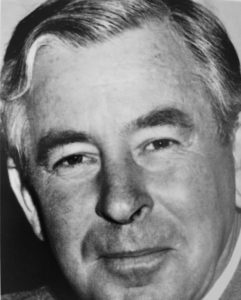
Sir Marcus Truby Beeck.
Sir Marcus Truby Beeck, farmer, grains industry leader and company director, was born on 28 December 1923 at “Gannawarra“, Katanning, Western Australia, second of four sons of Gustav Edwin Beeck, a South Australian-born farmer of German descent, and his wife Martha Ellen, née Keast, who came from Sydney. Continue reading
.
FURTHER READING
MALCOLM BEECK
Vintage Tractor Collection
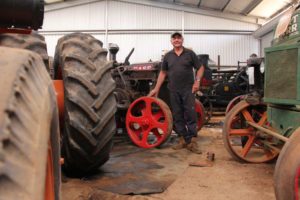
Mal Beeck keeps his collection in a shed on his son’s property.
(ABC Rural: Tyne Logan)
ABC Rural / By Tyne Logan
Many sheds are full of dusty collections of tractors but for one Western Australian farmer, it is more than just a hobby. Tractor enthusiast Mal Beeck said his collection was something he believed helped his mental health. In a shed on his son’s property at Katanning, retired farmer Mr Beeck keeps 99 years’ worth of tractor history.
More than 50 vintage tractors ranging from the late 1910s to the 1950s are on display and most importantly, according to Mr Beeck, they all work. “All these tractors do go and I take them to rallies, shows, plough days,” Mr Beeck said. Continue reading
Listen to the ABC Rural Report: Click HERE:
.
BEECK SURNAME
From “The Internet Surname Database”
This famous surname recorded in over fifty different spellings, derives from the pre-5th century Olde German and later Anglo-Saxon word “bah” or “baecc”. This word describes a stream, or as a name specifically someone who lived or worked by a stream. The various spellings of the modern surname which dates from the early13th century, include Bach, Bache, Batch, Beck, Beckmann, Pach, Pacher, Pachmann, Becker, Bacher, Ubach, and many more. The name is recorded in almost every European country, but is most popular in Germany and England.
It is fact in the latter country that most of the really early recordings are to be found. England was the first country to adopt hereditary surnames as we know them today, for all its people. Early surname recordings in other countries where they exist, usually refer only to the nobility or clergy. Amongst these very early English recordings are those of Robert de Basche, a witness at the Assize Court of the town of Stafford in the year 1199, whilst in Germany in 1447 Heinrich Bach is recorded as being the priest at the town of Villingen. Johann Sebastian Bach (1685 – 1750) the famous German composer; was the musical director to Prince Leopold of Kothen in 1716, and later musical director for the city of Leipzig from 1728 to his death. The first recorded spelling of the family name is believed to be that of Reiner de Bache, which was dated 1212, in the rolls of the county of Lincolnshire, England. Throughout the centuries, surnames in every country have continued to “develop” often leading to astonishing variants of the original spelling.
Beeck Family. Beeck Family. Beeck Family. Beeck Family. Beeck Family. Beeck Family. Beeck Family. Beeck Family. Beeck Family. Beeck Family. Beeck Family. Beeck Family. Beeck Family. Beeck Family. Beeck Family.
